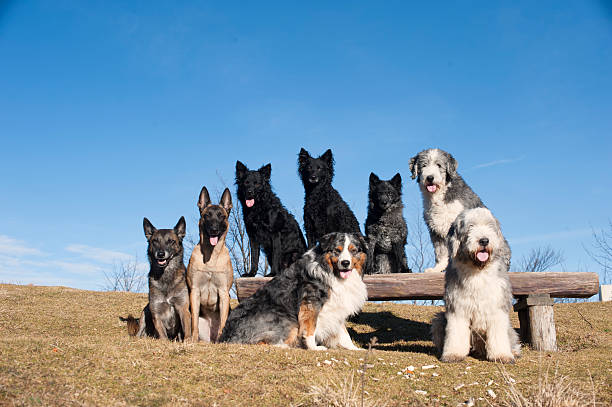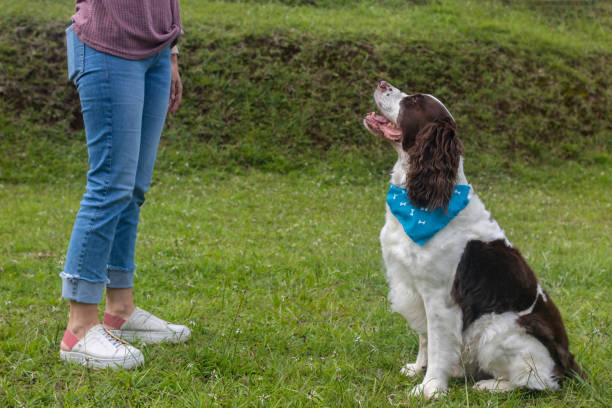It is crucial to prevent your dog from roaming around the house unsupervised as doing so may lead to urination, defecation, and even furniture chewing when left alone for prolonged periods.
There are many reasons why some dogs have trouble being housebroken: they may be too young (under six months), suffer from separation anxiety, or they’re stressed by the changes that come with a new owner. The following tips can help you potty train your dog quickly and easily.
Pick Up Your Dog’s Poop!
No one likes to step in dog poop, so be sure your dog learns from his mistakes by picking up his waste immediately following an accident. If you’re using a newspaper or a pee pad, dispose of it quickly and properly as well (do not flush the paper down the toilet or throw it in the trash). Scoop the litter box for your cat, too!


Feed Your Dog on a Schedule
A dog’s stomach is similar to a human’s. Feeding them at regular times will help you predict when they need to go outside. If you feed your dog twice a day, take him outside about five minutes after the second meal. Be sure to provide your dog with fresh water at all times!


Limit Drinking, But Not Too Much
Drinking too much water in a short period of time can cause them to have diarrhoea, which makes training more difficult for you both. Try limiting your dog’s access to water to just a few small cups throughout the day.
Allow Access to a Crate or Small Room
Closets, baby gates, and crates can all be used successfully when housebreaking your dog. Just make sure they are treated with respect – dogs should not be confined for too long. If you have any questions about this, be sure to ask your vet.
Housetraining a Puppy? Keep Him Close!
Housebreaking a puppy is not too different from housebreaking an adult dog. The only exception may be that you need to take them outside more often, especially since they can’t hold their bladder for long.


Don’t Get Upset with Accidents
Accidents happen, even if you’re doing everything right. Make sure to clean up any waste as soon as possible (you may want to use an enzyme cleaner) and clean and treat any damage done by your dog. Don’t punish them harshly for accidents – this will stress them out.
Take Your Dog Out Often
Taking your dog outside for the right reasons will make housetraining easier. If you let them out with a leash, they’ll learn to hold their bladder for longer periods of time, and you can also reward them for making it outside.


Reward Good Behaviour
Positive reinforcement makes learning easier and faster. When you come home or after your dog goes outside, be sure to give him a treat and praise him for going where he is supposed to.
The Best Way to House Train a Puppy
The most important thing in house training a puppy is not starting too early. A puppy cannot hold their bladder for long periods of time and so you want to try and wait until they are about six months old. When potty training a puppy, it is also important to use tools such as a crate with pee pads or newspaper if they can’t go outside. Be sure to take your dog outside every few hours so that they have the opportunity to go out and reinforce positive behaviour.
Tips for Housebreaking Your Dog
Proper dog housebreaking is one of the most important aspects of owning a pet. It is not always easy to do, but there are some steps you can take to make sure you are successful.
1) Make sure your dog knows where it is allowed to go to the bathroom. This includes letting your dog know where they can pee and which areas they cannot pee in.
2) Take your pup out every hour or so. Taking them out at regular intervals won’t be as much of a shock for their bladder when they finally go because they will be used to going every few hours.
3) Create an indoor potty area with special materials for your pup. Keep this area near where you take them out to go potty.
4) Crate train your dog. This will help you track when they are going to the bathroom because you can put them in their crate when they begin circling and sleeping in a certain area. This is usually a sign that your pup needs to go outside soon.
5) Be consistent with your pup. When you are crate training your dog and taking them out, be sure to go at the same time every day. If they start getting used to going outside more often, they will hold their bladder longer.
6) Clean up accidents thoroughly. This is especially important if you have a puppy. These memories will stay with your pup, and they will take it as a sign that this is an OK place to go.
7) Don’t punish your dog. If you catch them going potty somewhere they weren’t supposed to, don’t yell at them or hit them, as this will only scare the pup. Clean up the mess and take them outside at the next interval.
8) Be patient. This process can sometimes be frustrating and time-consuming, but it is well worth it in the end!
9) Keep your pup healthy. A healthy dog is a happy and more motivated dog, so keep an eye on their weight and food intake if they have issues holding their bladder for a long time.


How to Know if Your Dog Needs to Go Outside
Listed below are some easy ways you can tell if your dog needs to go out:
- Poor house manners
- Leaving soiled materials on the floor or carpet
- Panting heavily, with an arched back, pacing, whining or barking
- Excessively licking their genital area
It is important to remember that these are not guarantees, but the more of these behaviours your pup is showing, the greater chance they need to use the bathroom.
What to Do When Accidents Happen
Accidents will happen when you are training your dog to use the potty. It would help if you were patient with them, go back to step one in your housebreaking process and make sure they have access to the potty. If you’ve tried again with no success, it might be time for a little more discipline.
Preventing Accidents from Happening in the First Place
The first rule of dog potty training is to not begin before the puppy is ready. Puppies cannot hold their bladders for periods of longer than a few hours, so wait until they are at least four months old before you start.
Here are some other important things to remember when housebreaking your pup:
- Put newspapers or pee pads in the crate to have a place to go inside if they need it.
- Take your pup outside every few hours, even if you don’t think he needs to go out. This allows him to go potty and will help reinforce positive behaviour.
- If your pup doesn’t go potty, take him back inside and keep him on a leash near the door for 10 or 15 minutes. This will allow him to try again when he hears other dogs barking outside or smells another animal.
- Don’t scold the pup if they go in the house but don’t give them any attention if they go in the house either.
- Please don’t play with your pup or do anything else with him that might be fun until he goes to the bathroom outside. The most important thing is to learn where it’s okay to eliminate and how to do it outside.
- Be patient! Puppies may not do their business outside every time, but this isn’t a reflection of your training or the pup’s intelligence. He’s likely not ready yet.
- When it comes to feeding your dog, make sure you keep them on a schedule. Hunger is not what drives dogs to go potty, so take the opportunity away from him if he hasn’t gone outside yet.
- If your puppy has an accident in the house, it’s important to clean up thoroughly with a scent eliminator so that he doesn’t go back to a spot he could use before and have accidents there again.
- It’s also important not to rub the pup’s nose in his mess either. This will only cause more accidents in the future. Remove the smell instead, and he won’t have a reason to go back there again.


Things You Should Never Do with a Puppy While Potty Training
One of the most important things to do while potty training a puppy is to provide it with the right tools. This means providing the right type of litter box for them by providing a crate with newspapers or pee pads. You should also make sure that you take your puppy outside every few hours so that they have the opportunity to go out and reinforce the positive behaviour.
The last thing you should never do while potty training your puppy is punish them when they’ve done something wrong. This will only make them afraid to go potty in front of you.
Conclusion
We hope this article has been helpful and you’ve learned some tips for potty training your dog. Remember to be patient, provide the right tools and take him outside every few hours so that they have the opportunity to go out and reinforce positive behaviour. If all else fails, remember what not to do while potty training a puppy – don’t punish them when they’ve done something wrong as it will only make them afraid of going in front of you again.


